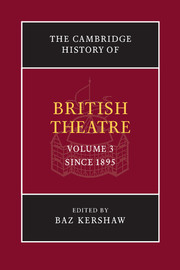Book contents
- Frontmatter
- Part I 1895–1946
- Part II Scottish and Welsh Theatres, 1895–2002
- Part III 1940–2002
- 13 British theatre, 1940–2002: an introduction
- 14 The establishment of mainstream theatre, 1946–1979
- 15 Alternative theatres, 1946–2000
- 16 Developments in the profession of theatre, 1946–2000
- 17 Case study: Theatre Workshop’s Oh What a Lovely War, 1963
- 18 1979 and after: a view
- 19 British theatre and commerce, 1979–2000
- 20 New theatre for new times: decentralisation, innovation and pluralism, 1975–2000
- 21 Theatre in Scotland in the 1990s and beyond
- 22 Theatre in Wales in the 1990s and beyond
- 23 English theatre in the 1990s and beyond
- Bibliography
- Index
- References
18 - 1979 and after: a view
from Part III - 1940–2002
Published online by Cambridge University Press: 28 March 2008
- Frontmatter
- Part I 1895–1946
- Part II Scottish and Welsh Theatres, 1895–2002
- Part III 1940–2002
- 13 British theatre, 1940–2002: an introduction
- 14 The establishment of mainstream theatre, 1946–1979
- 15 Alternative theatres, 1946–2000
- 16 Developments in the profession of theatre, 1946–2000
- 17 Case study: Theatre Workshop’s Oh What a Lovely War, 1963
- 18 1979 and after: a view
- 19 British theatre and commerce, 1979–2000
- 20 New theatre for new times: decentralisation, innovation and pluralism, 1975–2000
- 21 Theatre in Scotland in the 1990s and beyond
- 22 Theatre in Wales in the 1990s and beyond
- 23 English theatre in the 1990s and beyond
- Bibliography
- Index
- References
Summary
Lost and yet to come
The amorous catastrophe may be close to what has been called, in the psychotic domain, an extreme situation, ‘a situation experienced by the subject as irremediably bound to destroy him’ …the image is drawn from what occurred at Dachau. Is it not indecent to compare the situation of a love-sick subject to that of an inmate of Dachau? Can one of the most unimaginable insults of History be compared with a trivial, childish, sophisticated, obscure incident occurring to a comfortable subject who is merely the victim of his own Image-repertoire? Yet these two situations have this in common: they are, literally, panic situations: situations without reminder, without return …I am lost, forever.
Barthes’s comparison of a rejected lover with a prisoner at Dachau hangs frozen on the page. It is indecent, but it is also characteristic of much of the philosophy of the last two decades of the twentieth century in its rejection of history, abuse of scale and hence values, and in the removal of context which, if present, would render the point grossly inappropriate. From the perspective of a materialist history, the two situations have nothing in common.
The comparison is intended to demonstrate the dehumanising loss of ‘self’, yet, while self-confessedly self-centred, Barthes chooses to ignore the differences between a one-to-one relationship and the state-initiated and state-controlled Holocaust, indeed ‘one of the most unimaginable insults of History’. But like so much else in our post-modern culture, and in the arts of the fin du millennium, there is a dangerous absence of historical readings, of differences of context.
- Type
- Chapter
- Information
- The Cambridge History of British Theatre , pp. 412 - 425Publisher: Cambridge University PressPrint publication year: 2004
References
- 1
- Cited by

